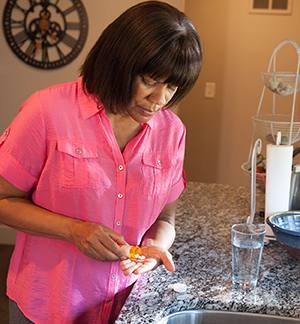Ménière’s disease is also called idiopathic endolymphatic hydrops. It is a problem in which the fluid pressure increases within the inner ear. It's one of the most common causes of dizziness that starts in the inner ear. Only one ear is usually involved, but both ears may be affected. Certain medicines can help manage the symptoms of this disease. Some help reduce fluid pressure in the inner ear. Others help ease symptoms themselves. There is no known medicine that will cure Ménière’s disease and no one medicine that is right for everyone. Discuss your options with your health care provider.
Reducing the fluid
Fluid buildup in your inner ear often causes the symptoms of Ménière’s disease. Medicines called diuretics rid the body of excess fluid. By doing so, they may help reduce fluid buildup in the ear. Diuretics (water pills) may cause your body to lose an important mineral called potassium. Because of this, you may also need to take dietary supplements.
Treating Ménière’s symptoms
Certain medicines can help control symptoms. They include:
-
Medicines to treat dizziness or vertigo. Examples are meclizine and diazepam.
-
Antinausea (also called antiemetic) medicines. These help ease nausea and vomiting. An example is promethazine.
-
Sedatives. These help you relax and sleep during a vertigo attack. An example is diazepam.
Attacks often cause nausea and vomiting. So these medicines may be given in the form of a rectal suppository. This helps make sure that the medicine stays in your system even if you throw up.
If treatment with medicine doesn't work, the health care provider may recommend surgery. This helps to reduce fluid pressure in the inner ear and to ease your symptoms.
Other medicines
Other medicines help reduce inner ear swelling. Some improve hearing. Others add to symptom relief. If one might be right for you, your health care provider can tell you more about it and how it's used.
Steroid therapy
Your health care provider may recommend a steroid injection in your middle ear. This can decrease or eliminate the vertigo episodes. This treatment has a small risk of leaving a permanent hole in the eardrum.
Antibiotic therapy
Certain antibiotics shut down the balance portion of the inner ear. This can ease symptoms of vertigo but may raise the risk of hearing loss. The treatment is most often given in the health care provider’s office. It's done over a period of several weeks. Liquid antibiotic is injected directly into the middle ear. The effect of this treatment is permanent. Talk with your provider about its benefits and risks and whether it is right for you.


